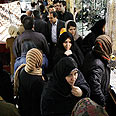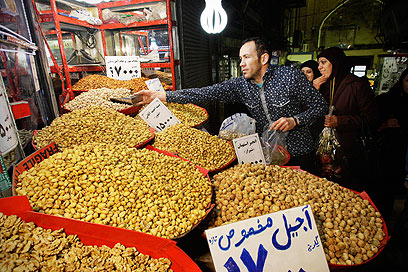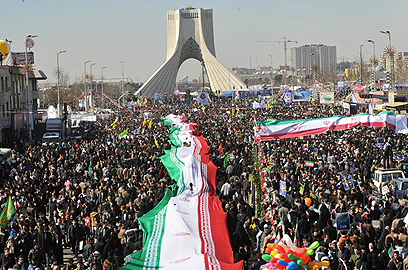
Iranians desperate as dark economic clouds gather
Tightening international sanctions over disputed nuclear program, combined with rampant inflation, drastically restrict ability of working-class Iranians to feed themselves and their families
Marjan Hamidi turned away from the butcher's shop in a crowded area of Tehran's sprawling bazaar. Her quest to buy reasonably priced groceries was not going well.
"Everything's become so expensive in the past few weeks, she said with disappointment. "But my husband's income stays the same. How am I going to live like this?"
Related stories:
- 'Israel will need 100 jets to attack Iran'
- Op-ed: Raising the stakes on Iran
- US sets sanctions on Iran's Intelligence Ministry
Tightening international sanctions against Iran over its disputed nuclear program, combined with rampant inflation, have drastically restricted the ability of working-class Iranians to feed themselves and their families.

Iranian President Mahmoud Ahmadinejad (Photo: EPA)
Uncertainty and financial hardship form the backdrop to a parliamentary election on March 2. The official inflation rate stands at 21 percent but critics of President Mahmoud Ahmadinejad and his handling of the economy say such figures are falsified and real inflation is around 50 percent.
"My purchasing power declines almost every day and the prices of basic foods are soaring overnight," said the 52-year-old mother in the vibrant, bustling covered market.
"My bank savings are shrinking. I can't afford the unbearable cost of living by only relying on my husband's pension," Hamidi said, as she pointed out the price of meat.
At $25 per kilo, it is increasingly beyond the reach of many Iranians. Three months ago it was $10 cheaper.
Maryam Bakhshian had come to the bazaar to buy fabric. Like most, her thoughts were occupied with the soaring prices.
"It is ironic," she said with a smile that did little to hide her frustration. "While I can hardly meet my daily needs, some people are stockpiling goods, fearing a possible shortage in the future."

Tehran bazaar - who can afford it? (Photo: AP)
Last month many in Tehran flocked to supermarkets and grocery stores, emptying shelves in anticipation of bad news. The rush was sparked by mounting speculation that Israel and the United States would launch military strikes against Iran's atomic sites.
Across the city, 60-year-old Mojtaba, a retired government employee, was stocking up at an upscale supermarket, his arms straining from the weight of bulging shopping bags.
"Forget perishable items like meat. If anything were to happen to the electricity, you'd be forced to throw everything out," he said, discussing his contingency plans for shortages.
"It's better to buy rice, canned foods, macaroni, pasta and cooking oil," he said, adding that to date he had bought 400 kg (880 lb) of rice, boxes of tinned food and other essentials.
While sanctions against Iran are not new, the most recent rounds have targeted the Islamic Republic's oil industry and financial institutions in the latest attempts to force its leadership to abandon what the West believes is a nuclear weapons program. Tehran maintains its nuclear activities are entirely peaceful.
Little effect?
The government says sanctions are having little effect but the plummeting value of the Iranian currency, the rial, is traumatizing Iranians. Despite measures by Iran's Central Bank to prop it up, the rial has lost half its value against the dollar since December.
Iranians are desperate to find safe havens for their savings and have been clamoring to buy hard currencies or gold.

Celebrating 33 years of revolution (Photo: MCT)
While many blame the sanctions for causing the spiral in prices, there is also much anger against the government for implementing economic reforms that withdrew heavily subsidies on fuel and basic foods at the end of 2010.
Many critics, including members of parliament, have voiced their concerns over the reforms in public and derided a monthly cash subsidy of $40 per person as insufficient.
"We might reach a stage when people would wish the law had never been put into force," said senior MP Mohammad Reza Bahonar, quoted in the Hambastegi daily.
Across the country, some Iranians simply cannot see how casting their vote in less than two weeks' time will improve their circumstances. Unsurprisingly, the country's leaders are increasingly wary of a low turnout in an election which has become dominated by talk of the economy.
"None of us in my family is planning to vote," said Parvin, a 59-year old housewife from the northern city of Gorgan. "It's the last thing we ever think of. In what way can it help?
"The sanctions are a problem, but the problem is also our own government's economic policies. Life is becoming intolerable."
'I don't want a child here'
Aside from the price of goods, employment is also a worrying subject for Iranians trying to make ends meet. Over the last year the mounting financial difficulties have had terrible consequences for businesses of all shapes and sizes. Tens of thousands of jobs have been lost and opposition websites have reported on strikes by workers who have not received wages for months.
Instead of thinking about the forthcoming elections, many Iranians are preoccupied with finding ways to minimize their suffering and maximize their resources. For the young, educated middle classes that means finding a way out of Iran.
Reza's goal is to reach France. "I don't want to have a child here," said the 30-year-old accountant as he stood in line at the French embassy in Tehran. "Any minute I can become jobless. There is no hope for me and my wife here.
"I just want to get out. I'll even work in McDonald's."
Hamed Hashemi has a similar goal, to go to Canada.
"I have a good salary but I can't do anything with it, said the 31-year-old marketing manager as he discussed the significant increase in house prices in recent weeks. "Even if I save all my income, it would take a lifetime to buy a house."
Kamyar has already obtained his visa for Norway, where he has received an offer to study at university. "What do I have to lose?" said the 26-year-old computer engineer. Without my parents' support, I can't manage myself, let alone getting married."
- Receive Ynetnews updates directly to your desktop










